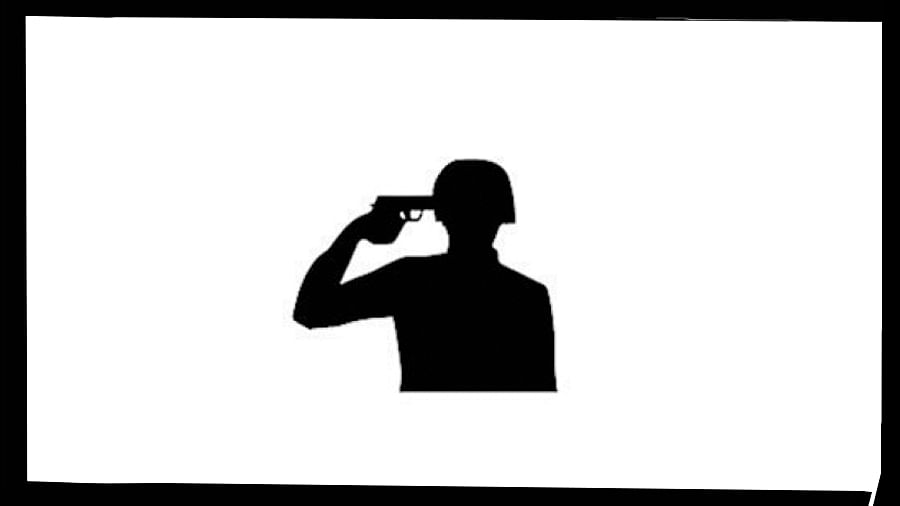
DH Illustration.
Every year, almost unfailingly, we hear of the heart-rending stories of students tragically ending their lives in Kota. While this remains a critical issue demanding attention, there is an equally pressing concern: suicides among the armed forces. Recently, an ‘Agniveer’ Indian Army soldier died by suicide by shooting himself while on sentry duty. Military honours were not extended for his funeral as deaths arising out of self-inflicted injuries are not given such honours by the Indian armed forces.
Last year, Minister of State for Defence Ajay Bhatt informed the Rajya Sabha that over the previous five years, there had been a total of 819 suicides within the armed forces -- 642 in the Army, 29 in the Navy, and 148 in the Air Force. Additionally, data provided by the Ministry of Home Affairs (MHA) to parliament in August 2023 revealed that 1,532 personnel from the Central Armed Police Forces (CAPF), which includes entities like the Central Reserve Police Force (CRPF), Border Security Force (BSF), Sashastra Seema Bal (SSB), Indo-Tibetan Border Police (ITBP), Central Industrial Security Force (CISF), Assam Rifles, and National Security Guard (NSG), have taken their own lives since 2011. Together, these forces comprise roughly 900,000 personnel.
Between 2010 and 2019, approximately 1,100 Indian defence personnel died by suicide, with the Army accounting for the majority of cases. Shockingly, the Army loses more personnel each year to suicides, incidents of fratricide, and other non-combat situations than in actual combat. Beyond the immense pain experienced by the affected families, this represents not only a loss of skilled manpower but also deals a blow to the morale and motivation of their fellow unit members.
The fact that nearly a hundred security personnel take their own lives annually signals an alarming trend within the country’s armed forces. This trend is deeply unsettling, as it robs us of our most valuable assets. The very individuals tasked with safeguarding our nation are themselves in need of help. These figures raise serious concerns about the mental well-being of soldiers, as well as their training and professionalism. It is imperative that this trend be urgently addressed.
The Defence ministry compiled data for cases of suicide during the period between January 1, 2014, and March 31, 2017, and came out with the shocking revelation that one person on duty from either the Army, Navy or Air Force ended life every three days. As per its data, 348 regulars died by suicide while on duty.
Retired officers, and various reports, often attribute responsibility for the stress that drives soldiers to suicide to systemic factors. These encompass inadequate leadership, indifferent attitudes among superiors, and reluctance to grant leave even when genuinely needed. These elements contribute to the stress experienced by military personnel.
The primary source of heightened stress levels arises from the prolonged duty hours, sometimes extending to around 15-16 hours daily. This situation is aggravated by the frequent and extended redeployment of troops for non-essential tasks. Additionally, the insufficient and interrupted rest due to extended duty hours further compounds the stress. Numerous studies have underscored the adverse effects of sleep deprivation even for a single night on the physical and mental well-being of individuals. Moreover, soldiers stationed in remote areas contend with feelings of isolation and solitude. The enduring effects of high-altitude conditions add to the challenges faced by these soldiers.
Furthermore, there is an increasing gap between senior officials and those in frontline operational roles. This widening divide negatively impacts morale across all ranks. Often, higher-ranking leaders make spur-of-the-moment decisions rather than adopting a more strategic, long-term perspective. For example, regimentation was eliminated in CRPF, ITBP and SSB in the early part of the previous decade despite its vital role in fostering unity, harmony, and mutual understanding between troops
and their commanders.
The authoritative conduct of senior officials can also contribute to stress on occasion. Military personnel are reprimanded publicly, leading to a decrease in their self-esteem. Moreover, they are repeatedly reminded of their mistakes, making it challenging to move beyond them and causing psychological distress for the individuals involved.
The Defence Institute of Psychological Research (DIPR) provided several recommendations when addressing the issue of suicides. DIPR has proposed measures to tackle suicidal behaviour among armed forces personnel, including rationalising leave policies, reducing workloads, increasing compensation, and promoting better interpersonal relations between officers and soldiers. Nevertheless, the attrition rate remains high, suggesting that these measures may not be consistently or effectively implemented.
The stigma surrounding mental health also discourages personnel from seeking help. In a study published in the Medical Journal Armed Forces India, 90% of the surveyed patients admitted to facing some form of stigma, regardless of age, rank, education, or mental conditioning; the study also found that women experienced more stigma. This highlights that the stigma surrounding mental health serves as a barrier to accessing mental healthcare.
According to some armed forces personnel (who wish to remain anonymous), there is no established mechanism for addressing stress. Although it is claimed that trained professionals are available for assistance, the reality on the ground is that soldiers often have to navigate these challenges on their own. If a superior is considerate and compassionate, they may encourage their troops to watch out for signs of stress among each other, but otherwise, there is no formal system in place.
The Indian armed forces, often lauded as one of the most disciplined forces globally, cannot afford to overlook this issue and must take proactive steps to address it. Rather than solely prioritising physical strength and toughness, it is crucial to focus on mental resilience as well. Measures such as mandatory psychological assessments for all ranks at an age where the majority of personnel face mental health challenges, counselling before and after leaves of absence, shorter deployment tenures, increased recreational activities,
and comprehensive training programmes in stress management and psychological counselling will significantly contribute to addressing this alarming and distressing trend.
(The writers are students at National Law University, Jodhpur)